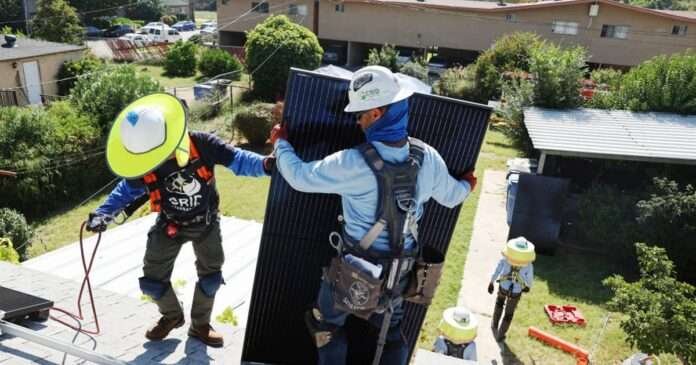“If you’re doing home improvement contracts, by law you have to warranty your work for 10 years,” she said. That shift would not only undermine solar contractors’ ability to install new projects, but potentially threaten their ability to service or maintain already installed projects, since that follow-up work would void the existing warranty, she said.
Doherty disputed that characterization. “The majority of contractors doing this work are already C-10 license holders,” he said, including at least 2,300 businesses working in the solar and battery field. “The argument the C-46 contractors have been making for years is, this is a great career. Well, it’s not a great career if you’re only trained to install solar panels.”
But the lawsuit against CSLB argues that C-46 license holders shouldn’t be considered less skilled or experienced than C-10 license holders when it comes to installing batteries. According to the written complaint, the decision ignores “the fact that CSLB’s own license exam requires solar contractors have extensive knowledge of the California Electrical Code and other relevant rules and regulations to safely perform battery work.”
The two sides also dispute how much the decision will harm the state’s solar contractors. During the CSLB’s April board hearing, Love stated that “most C-46s have a C-10 certification, and we’re only talking about, according to the last study, 400 contractors” who lack that certification that will be subject to the new regulation.
But those roughly 450 holders of C-46 licenses may well have trouble obtaining the C-10 licenses, Del Chiaro said, given the delays the CSLB is likely to face in processing the flood of applications and tests required before the new rule would go into effect later this year.
More onerous, Del Chiaro said, is that Californla labor code requires C-10 license holders to hire only certified electricians to do the types of work specified by the CSLB. This requirement, which is unique to California, does allow electrician union apprentices or certified electrical worker trainees to work with a certified electrician on a one-to-one ratio, she said.
But this requirement could make it very difficult for contractors to hire enough workers that qualify under the rule, given the severe shortage of certified electricians in the state. What’s more, far more experienced battery installers would have to undergo three to five years of work under an already-licensed electrician to earn their own license — and any previous experience with installing batteries that employees of C-46 licensed contractors may have doesn’t count, she said.
Daniel Kammen, a professor at the University of California, Berkeley who has advised the U.S. government on energy policy, reiterated these points in a letter to CSLB.
“Prohibiting C-46 contractors who currently install and maintain battery energy storage systems from continuing to do the types of projects that they have already been doing in California will threaten jobs and slow the pace that new storage projects will come online,” Kammen wrote. “Moreover, it won’t be easy for solar contractors to get a C-10 electrical license and continue their business. And it won’t be easy for solar workers to become certified electricians, or even possible for many.”
Doherty questioned whether obtaining the required license was as difficult as opponents implied. “They can have a qualified person on their license to get a C-10. They can have an employee as a responsible employee for the license to bridge that time,” he said.
But Del Chiaro argued that the shortage of C-10 licensed electricians will make taking those steps harder than electrical unions make it out to be. “IBEW is plenty busy. There’s a shortage of electricians in California and elsewhere,” she said. “They’re not clamoring to climb onto roofs and into closets and attics.”
Del Chiaro also pointed out that it will take too much time for C-46 license holders to complete the required training to receive the C-10 license “If they’ve been doing solar and batteries for 7 to 10 years — the best couple of guys every contractor has built their company around — if they’ve been working for a C-46 contractor, they’re not eligible to sit for a C-10 test. They have to leave that company, work for a C-10, and do that work for 3 to 5 years,” she said.
The cost to consumers
If as a result of CLSB’s decision, C-46 license holders are forced to halt work, the economic impacts could be significant, according to a study CALSSA commissioned from analysis firm Beacon Economics. That report, issued last year, found that the rule could block $120 million in solar projects from moving forward in the first year of its implementation, and lead to $53 million in reduced primary economic activity in the state from stopping those projects.
Those costs won’t be counterbalanced by any benefits, Beacon’s report found, because no record of any “fire and/or economic loss” from an improperly installed battery has been submitted to the record in the decision. “Thus, Beacon was not able to find any economic damage that the CSLB’s rule would prevent.”
The CSLB decision has also faced pushback from homeowners and consumers, some of whom testified against it at its April board meeting. “As a consumer, I want the best person working on my rooftop solar or battery system. Who are those people? They are the people who have done the installing in the first place. They’ve taken certification tests and they have proven themselves,” Lee Miller, a Sacramento homeowner with a solar and battery system, said at the hearing.
“This proposal seems to be more aligned with limiting access to rooftop solar and battery systems,” she said. “It prioritizes utility interests over consumer protection.”
Representatives of labor unions unaffiliated with electrical workers have echoed those criticisms.
“Our main mission is the protection of the consumer,” David De La Torre, secretary-treasurer of Laborers International Union of North America Local 261, said at the April hearing. He and one other member of the CSLB board, which totals 15, voted against the decision.
La Torre noted that the Berkeley Labor Center report failed to cite any instances of faulty installation across the entire state. “I don’t think the data is there. It doesn’t support the necessity to regulate, to confine the installation of [batteries] to a C-10 … I think we’re overreaching a little.”

Source link
#front #Californias #solar #wars #Whos #allowed #install #batteries





